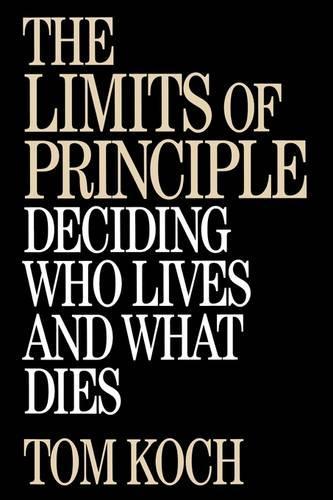
The Limits of Principle: Deciding Who Lives and What Dies
(Hardback)
Publishing Details
The Limits of Principle: Deciding Who Lives and What Dies
By (Author) Tom Koch
Bloomsbury Publishing PLC
Praeger Publishers Inc
30th December 1998
United States
Classifications
Tertiary Education
Non Fiction
Ethics and moral philosophy
174.24
Physical Properties
Hardback
192
Description
As a society, we are faced with a series of dilemmasabortion, euthanasia, genetic engineering, organ transplant allocation, support or non-support of the elderly and fragilethat seem to offer no resolution. How do we choose between the needy and the ailing Choices must be made in both the world of law and the realm of medical ethics. What we need is what we do not havea perspective in the larger sense of the worda view that makes apparent the sweep of the issues at hand. The failure of perspective in bioethics and medical decision making is absolute. It results from the limits of an 18th century philosophy and philosophical method. Simply, current methods of examining these issues can not resolve them because the method itself is limited. Answers are possible. They require, Koch argues, a new approach. In it, principle is the goal, not the mechanism of solution. Its parts must be defined and their application considered in context. This is demonstrated using two distinct contemporary problems. The first: Who gets available organ transplants How do we decide between the equally needy when there are not enough organs for all The second: The problem of Baby K, the care or non-care of brain stem, anencephalic babies. These problems are defined using multicriterion approach and resolved through a series of focus group discussions that involve medical and lay personnel. What results is a new, more inclusive view of medicine and a new, more complex understanding of what consensus may mean in an evolving, twenty-first century society. This is must reading for lay people, medical personal, and policymakers concerned with bioethics and medical philosophy issues.
Reviews
"I am convinced that Koch's MCDM approach has proven itself to be an invaluable bioethical tool, bridging principle and practice to articulate a hierarchy of biopsychosocial criteria for the selection of candidates for any potentially lifesaving procedure where demand exceeds supply. This book is a 'must read' for anyone involved in tertiary medical practice!"-Kathryn L. Braun, DrPH Associate Professor and Director, Center on Aging School of Public Health, University of Hawaii
"I found The Limits of Prinicple to be a provocative, groundbreaking approach to bioethics....I recommend this book to anyone seeking to improve our ability to provide quality medical care in situations that raise difficult ethical questions."-James G. Dolan, MD Associate Professor of Medicine, University of Rochester
"Impressive! Koch shows how to include both individuals and the community in health care decision making. His approach is qualitative and rigorous and his conclusions are thought provoking."-Daniel Burston, Associate Professor Psychology Department, Duquesne University Author, The Wing of Madness
"This book is Koch at his most cogent and persuasive. It is a pleasure to read, and more importantly, may point the way out of the intractable ethical dilemmas that have bedeviled the field for so many years, and which promise to worsen considerably with the passage of time, unless his advice is heeded. This is must reading...."-Arlette Lefebvre, MD, FRCP, O.On. Associate Professor of Psychiatry, Univ. of Toronto Staff Psychiatrist, Hospital for Sick Children, Toronto
Koch's work highlights how people think about complex issues and reinforces the priority they give to relationships, even relationships with the most visibly compromised people. For gerontologists, who are interested in ethics and social policy, the book provides a useful way to think about important philosophically oriented public issues. The book has important things to say about these significant subjects. It is worth reading. This book...has practical and philosophical importance as we move into the 21st century; it will provoke significant questions about what matters as we think about health care reform and our lives as both individuals and members of communities.-Contemporary Gerontology
"Koch's work highlights how people think about complex issues and reinforces the priority they give to relationships, even relationships with the most visibly compromised people. For gerontologists, who are interested in ethics and social policy, the book provides a useful way to think about important philosophically oriented public issues. The book has important things to say about these significant subjects. It is worth reading. This book...has practical and philosophical importance as we move into the 21st century; it will provoke significant questions about what matters as we think about health care reform and our lives as both individuals and members of communities."-Contemporary Gerontology
Author Bio
TOM KOCH is a research associate in bioethics, The Hospital for Sick Children, Toronto. He is the author of eight other books, including Mirrored Lives: Aging Children and Elderly Parents (Praeger, 1990) and A Place in Time: Caregivers for Their Elderly (Praeger, 1993).
